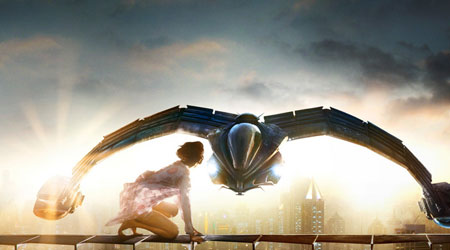(单词翻译:单击)
Once upon a time, science fiction was just a genre among other genres. There were crime stories, there were horror stories, there was literary fiction–and there was science fiction.
曾几何时,科幻小说不过是诸多小说类别中的一种:犯罪小说、恐怖小说、文学小说……还有,科幻小说。
But today science themes dominate these other genres. It’s difficult to think of much modern crime, horror or “serious” fiction that doesn’t involve science.
但现在,科幻主题却占领了其他类型的小说。我们已经很难想象现代犯罪小说、恐怖小说或者其它“严肃”的文学作品中有哪些是不涉及科幻元素的。

And it’s not just books. With every second movie and computer game having a sci-fi element, science fiction seems to have colonized our entire entertainment culture.
不仅仅是书籍,电影和电脑游戏也不例外,每一秒似乎都离不开科幻元素。科幻似乎已经占领了整个娱乐文化。
It’s clear that if we want to define science fiction we should relate it to the role that science plays in our lives. Perhaps the place to start is by noting when it began.
我们都清楚,要想给科幻小说下个定义,就不得不考虑到科学在我们生活中所扮演的角色。也许,我们应该从科幻小说的缘起谈起。
Although some experts have claimed to be able to trace sci-fi back to ancient times, it is more plausible to find it in fledgling form in the 19th century, when industrial societies emerged.
尽管一些专家声称科幻小说的诞生可以追溯到遥远的古代,但科幻小说于19世纪初具雏形的说法似乎更为可信,因为当时正值工业社会出现。
One of the features that set industrial societies apart from other kinds was the increasing part that science played in everyday life. Factories with vast machines churned out huge quantities of goods, which were transported by trains, motor vehicles and ships all over the world. Cities were built on the back of technology, with electricity in homes and hospitals helping everyone to lead healthier, more convenient lives. All of these changes had profound effects not only on people’s real lives, but on their imaginative ones.
工业社会区别于其它社会类型的特征之一就是科学在人们生活中扮演了日益重要的角色:工厂林立,巨大的机器批量生产出各种产品,经火车、汽车和轮船运往世界各地。城市建设也离不开科技,家庭和医院都通上了电,人们的生活因此变得更健康、更便利。所有这些变化不仅对人们的实际生活产生了深远影响,也同样影响了他们想象中的生活。
Writers began to articulate these changing physical and mental landscapes, eventually giving science fiction a large and devoted fanbase of especially young readers, who found that it spoke to their curiosity about the future that science would create.
作家们开始将这些变化中的现实世界和想象中的世界联系起来,科幻小说因此逐渐吸引了一大批忠实读者。特别是年轻读者,他们对科学创造的未来充满好奇,而这些小说正满足了他们的好奇心。
But sci-fi reflected fears about science more than it did hopes. These early novels were dystopian rather than utopian.
不过,科幻小说反映更多的并不是对科学的希望,而是恐惧。早期的科幻小说大多是反乌托邦式的。
The typical early science fiction novel might be a UK novel like H.G. Wells’ The War of the Worlds (1897). With great skill, Wells played upon the fears of technology by imagining Earth under threat by a civilization –that of men from Mars.
比如早期科幻小说的代表作品——英国小说家赫伯特•乔治•威尔斯的《星际战争》(1897)。小说中,威尔斯想象了地球遭受火星文明威胁的情景,并用精湛的写作技巧展现出人们对科技的恐惧。
The science fiction of today expresses the impact of the computing revolution, robotics and our environmental challenges, while it is less concerned with “little green men from Mars” and other themes of past sci-fi.
现在的科幻小说则更多地着墨于计算机革命、机器人还有环境问题对人类的影响,而类似 “来自火星的小绿人”和过去的科幻主题已经很少有作家涉及。
Given that science, technology and politics are always intertwined, contemporary science fiction often has a great deal to say about power. Many recent novels – like American Cory Doctorow’s Little Brother (2008)– are concerned with government and security service “conspiracies” against the people, particularly as the revelations of whistleblowers like Edward Snowden sink in. This can give sci-fi writing a “paranoid” feel.
由于科学、技术与政治的话题总是彼此交错,权力在当代科幻小说中成了重头戏。近年来,随着揭发真相的“告密者”们(比如爱德华•斯诺登)走入人们的视线,很多科幻小说都围绕政府与安全机构密谋侵犯人民权利而展开,美国科幻小说家科里•多克托罗的《小兄弟》(2008)就是一例。科幻小说也因此平添了一分“多疑偏执”的感觉。
This underlines one of the features that remains constant between the beginnings of the empire of science fiction and its state today.
这也成为科幻小说“帝国”从建立之初至今都存在的一个特点。
As then, so now: We want to read about how fearful the future will be, not how it will be a paradise.
鉴于此,我们想读到的不再是未来如何变成美好的天堂,而是未来到底有多可怕。


